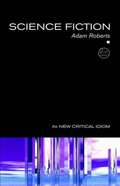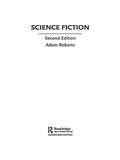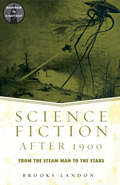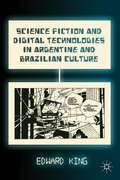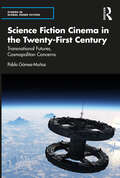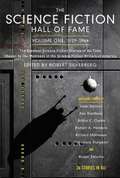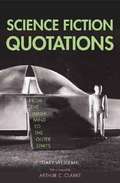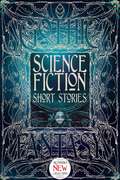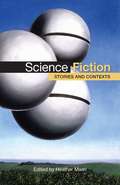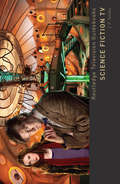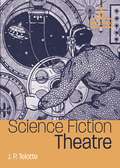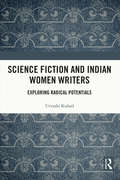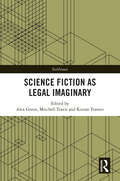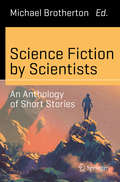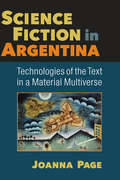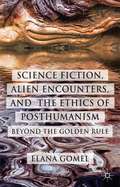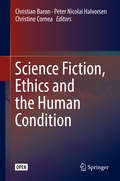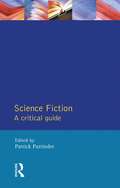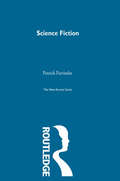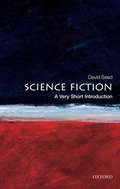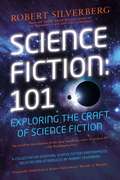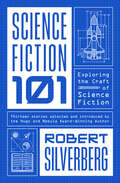- Table View
- List View
Science Fiction (Revised Edition)
by Elizabeth J. Pearson Sylvia Z. BrodkinThis book is a collection of science fiction stories which include Of Missing Persons, Litterbug, The Winner, The Sentinel etc.
Science Fiction (Second Edition)
by Adam RobertsScience Fiction is a fascinating and comprehensive introduction to one of the most popular areas of modern culture. This second edition reflects how the field is rapidly changing in both its practice and its critical reception
Science Fiction (The New Critical Idiom #Vol. 39672)
by Adam RobertsScience Fiction is a fascinating and comprehensive introduction to one of the most popular areas of modern culture. This second edition reflects how the field is rapidly changing in both its practice and its critical reception. With an entirely new conclusion and all other chapters fully reworked and updated, this volume includes: a concise history of science fiction and the ways in which the genre has been used and defined explanations of key concepts in Science Fiction criticism and theory through chapters such as Gender, Race, Technology and Metaphor examines the interactions between Science Fiction and Science Fact anchors each chapter with a case study drawn from short story, book or film, from Frank Herbert’s Dune to Star Wars, from The Left Hand of Darkness to Neuromancer. Introducing the reader to nineteenth-century, Pulp, Golden Age, New Wave, Feminist and Cyberpunk science fictions, this is the essential contemporary guide to a major cultural movement.
Science Fiction After 1900: From the Steam Man to the Stars (Genres in Context)
by Brooks LandonFirst published in 2003. Routledge is an imprint of Taylor & Francis, an informa company.
Science Fiction And Digital Technologies In Argentine And Brazilian Culture
by Edward KingFictional narratives produced in Latin America often borrow tropes from contemporary science fiction to examine the shifts in the nature of power in neoliberal society. King examines how this leads towards a market-governed control society and also explores new models of agency beyond that of the individual.
Science Fiction Cinema in the Twenty-First Century: Transnational Futures, Cosmopolitan Concerns (Studies in Global Genre Fiction)
by Pablo Gómez-MuñozRecent films are increasingly using themes and conventions of science fiction such as dystopian societies, catastrophic environmental disasters, apocalyptic scenarios, aliens, monsters, time travel, teleportation, and supernatural abilities to address cosmopolitan concerns such as human rights, climate change, economic precarity, and mobility. This book identifies and analyses the new transnational turn towards cosmopolitanism in science fiction cinema since the beginning of the twenty-first century. The book considers a wide selection of examples, including case studies of films such as Elysium, In Time, 2012, Andrew Niccol’s The Host, Codependent Lesbian Space Alien Seeks Same, and Cloud Atlas. It also questions the seeming cosmopolitanism of these narratives and exposes how they sometimes reproduce social hierarchies and exploitative practices. Dealing with diverse, interdisciplinary concerns represented in cinema, this book in the Studies in Global Genre Fiction series will be of interest to readers and scholars working in the fields of science fiction, film and media studies, cosmopolitanism, border theory, popular culture, and cultural studies. It will also appeal to fans of science fiction cinema and literature.
Science Fiction Cinema in the Twenty-First Century: Transnational Futures, Cosmopolitan Concerns (Studies in Global Genre Fiction)
by Pablo Gómez-MuñozRecent films are increasingly using themes and conventions of science fiction such as dystopian societies, catastrophic environmental disasters, apocalyptic scenarios, aliens, monsters, time travel, teleportation, and supernatural abilities to address cosmopolitan concerns such as human rights, climate change, economic precarity, and mobility. This book identifies and analyses the new transnational turn towards cosmopolitanism in science fiction cinema since the beginning of the twenty-first century.The book considers a wide selection of examples, including case studies of films such as Elysium, In Time, 2012, Andrew Niccol’s The Host, Codependent Lesbian Space Alien Seeks Same, and Cloud Atlas. It also questions the seeming cosmopolitanism of these narratives and exposes how they sometimes reproduce social hierarchies and exploitative practices.Dealing with diverse, interdisciplinary concerns represented in cinema, this book in the Studies in Global Genre Fiction series will be of interest to readers and scholars working in the fields of science fiction, film and media studies, cosmopolitanism, border theory, popular culture, and cultural studies. It will also appeal to fans of science fiction cinema and literature.
Science Fiction Hall of Fame, Volume One
by Robert Silverberg26 of the best sci-fi short stories ever written. These stories were selected by members of the Science Fiction Writers of America.
Science Fiction Quotations: From the Inner Mind to the Outer Limits
by Arthur C. Clarke Gary WestfahlIn this unprecedented collection of science fiction and fantasy quotations, the reader revisits the stunning moment when Mary Shelley's Frankenstein monster first comes to life; witnesses the transformation of Robert Louis Stevenson's Dr. Jekyll into Mr. Hyde; is present when Bruce Wayne resolves to become Batman; and overhears the cosmic conclusions of The Incredible Shrinking Man. Drawing upon two centuries of the vast and provocative literature of science fiction and fantasy, this comprehensive book presents more than 2,900 quotations from wide-ranging sources, including science fiction and fantasy stories, novels, films, and television programs. The quotations are organized by topic-alien worlds; darkness and light; robots, androids, and cyborgs; machines and technology; weapons; and more than one hundred others. The reader will encounter the wit and wisdom of renowned authors (H. G. Wells, Ray Bradbury, J. R. R. Tolkien, Ursula K. Le Guin) along with definitive versions of such important statements as Isaac Asimov's Three Laws of Robotics and Star Trek's Prime Directive. With its thorough index, this book is both an invaluable resource for the writer or scholar and an irresistible page-turner for the curious browser.
Science Fiction Short Stories (Gothic Fantasy)
by David Tallerman Beth Cato Kate O'Connor Brian Trent Mike Morgan Rachael K. Jones Edward Ahern Stewart C. Baker Keyan Bowes Sarah Hans Rob Hartzell Alexis A. Hunter Jacob M. Lambert Adrian Ludens Conor Powers-Smith Zach Shephard Patrick Tumblety Donald Jacob Uitvlugt M. Darusha Wehm Nemma WollenfangNew Author and collections. A deluxe edition of super-charged, original and classic short stories. Dystopia, Post-Apocalypse, time travel, robots and more this brilliant collection brings together the best of today's writers (many stories previously unpublished), with an eclectic range of science fiction masters including H. Rider Haggard, Stanley G. Weinbaum, Philip Frances Nowlan, Edward Page Mitchell and Jack London.An eclectic collection of SF adventure tales.
Science Fiction Stories and Contexts
by Heather MasriExcellent collections of science fiction abound, but very few have been prepared expressly for classroom use. Heather Masri, editor of "Science Fiction: Stories and Contexts," has prepared an anthology that recognizes, and is designed to meet, the needs of students and instructors in an introductory survey course in science fiction. Grouped into major themes, her comprehensive selection of fiction -- enjoyable and captivating stories, notable for their literary, philosophical, and cultural richness -- are by classic and emerging writers from the nineteenth to the twenty-first centuries. The stories are uniquely complemented by contextual documents that suggest the scholarly, theoretical, and historical currents that drove the development of the genre, and informative editorial matter that contributes to the book's flexibility for instructors and usefulness for students.
Science Fiction TV (Routledge Television Guidebooks)
by J. P. TelotteThe first in the Routledge Television Guidebooks series, Science Fiction TV offers an introduction to the versatile and evolving genre of science fiction television, combining historical overview with textual readings to analyze its development and ever-increasing popularity. J. P. Telotte discusses science fiction’s cultural progressiveness and the breadth of its technological and narrative possibilities, exploring SFTV from its roots in the pulp magazines and radio serials of the 1930s all the way up to the present. From formative series like Captain Video to contemporary, cutting-edge shows like Firefly and long-lived popular revivals such as Doctor Who and Star Trek, Telotte insightfully tracks the history and growth of this crucial genre, along with its dedicated fandom and special venues, such as the Syfy Channel. In addition, each chapter features an in-depth exploration of a range of key historical and contemporary series, including: -Captain Video and His Video Rangers -The Twilight Zone -Battlestar Galactica -Farscape -Fringe Incorporating a comprehensive videography, discussion questions, and a detailed bibliography for additional reading, J. P. Telotte has created a concise yet thought-provoking guide to SFTV, a book that will appeal not only to dedicated science fiction fans but to students of popular culture and media as well.
Science Fiction Theatre (TV Milestones Series)
by J. P. TelotteIn the wake of the juvenile space operas of the early 1950s, a groundbreaking series debuted and paved the way for one of viewers’ favorite genres today: adult-oriented science fiction. Science Fiction Theatre aired with a fresh anthology-style narrative from the vision of veteran producer Ivan Tors and with compelling narration by Truman Bradley. Created by industry-leading syndicator Ziv Television Programs, the show pioneered a scientifically based approach to aliens, telepathy, and the mysteries of the universe that provided a model for Rod Serling’s The Twilight Zone (1959–64) and a myriad of acclaimed programs that followed, including The Outer Limits (1963–65), The Ray Bradbury Theater (1985–92),and Black Mirror (2011–present). This book contextualizes Science Fiction Theatre within the budding American television industry of the 1950s, as powerful networks and independent producers and syndicators vied to create and distribute programming to an audience eager to embrace this new, free medium. Including a complete videography of this historically neglected series, author J. P. Telotte illuminates Science Fiction Theatre as a touchstone for understanding the development of science fiction media and the dynamic nature of early television broadcasting.
Science Fiction and Indian Women Writers: Exploring Radical Potentials
by Urvashi KuhadScience fiction, as a literature of fantasy, goes beyond the mundane to ask the question: what if the world were different from the way it is? It often challenges the real, builds on imagination, places no limits on human capacities, and encourages readers to think outside their social and cultural conditioning. This book presents a systematic study of Indian women’s science fiction. It offers a critical analysis of the works of four female Indian writers of science fiction: Rokeya Sakhawat Hossain, Manjula Padmanabhan, Priya Sarukkai Chabria and Vandana Singh. The author considers not only the evolution of science fiction writing in India, but also discusses the use of innovations and unique themes including science fiction in different Indian languages; the literary, political, and educational activism of the women writers; and eco-feminism and the idea of cloning in writing, to argue that this genre could be viewed as a vibrant representation of freedom of expression and radical literature. This ground-breaking volume will be useful for scholars and researchers of English literature. It will also prove a very useful source for further studies into Indian literature, science and technology studies, women’s and gender studies, comparative literature and cultural studies.
Science Fiction as Legal Imaginary (TechNomos)
by Alex Green, Mitchell Travis and Kieran TranterThis book examines how science fiction informs the legal imagination of technological futures.Science fiction, the contributors to this book argue, is a storehouse of images, tropes, concepts and memes that inform the legal imagination of the future, and in doing so generate impetus for change. Specifically, the contributors examine how science fictions imagine human life in space, in the digital and as formed and negotiated by corporations. They then connect this imaginary to how law should be understood in the present and changed for the future. Across the chapters, there is an urgent sense of the need for law – as it is has been, and as it might become – to order and safeguard the future for a multiplicity of vulnerable entities.This book will appeal to scholars and students with interests in law and technology, legal theory, cultural legal studies and law and the humanities.
Science Fiction by Scientists
by Michael BrothertonThis anthology contains fourteen intriguing stories by active research scientists and other writers trained in science. Science is at the heart of real science fiction, which is more than just westerns with ray guns or fantasy with spaceships. The people who do science and love science best are scientists. Scientists like Isaac Asimov, Arthur C. Clarke, and Fred Hoyle wrote some of the legendary tales of golden age science fiction. Today there is a new generation of scientists writing science fiction informed with the expertise of their fields, from astrophysics to computer science, biochemistry to rocket science, quantum physics to genetics, speculating about what is possible in our universe. Here lies the sense of wonder only science can deliver. All the stories in this volume are supplemented by afterwords commenting on the science underlying each story.
Science Fiction in Argentina: Technologies of the Text in a Material Multiverse
by Joanna PageIt has become something of a critical commonplace to claim that science fiction does not actually exist in Argentina. This book puts that claim to rest by identifying and analyzing a rich body of work that fits squarely in the genre. Joanna Page explores a range of texts stretching from 1875 to the present day and across a variety of media-literature, cinema, theatre, and comics-and studies the particular inflection many common discourses of science fiction (e.g., abuse of technology by authoritarian regimes, apocalyptic visions of environmental catastrophe) receive in the Argentine context. A central aim is to historicize these texts, showing how they register and rework the contexts of their production, particularly the hallmarks of modernity as a social and cultural force in Argentina. Another aim, held in tension with the first, is to respond to an important critique of historicism that unfolds in these texts. They frequently unpick the chronology of modernity, challenging the linear, universalizing models of development that underpin historicist accounts. They therefore demand a more nuanced set of readings that work to supplement, revise, and enrich the historicist perspective.
Science Fiction, Alien Encounters, and the Ethics of Posthumanism
by Elana GomelScience Fiction, Alien Encounters, and the Ethics of Posthumanism offers a typology of alien encounters and addresses a range of texts including classic novels of alien encounter by H. G. Wells and Robert Heinlein; recent blockbusters by Greg Bear, Octavia Butler and Sheri Tepper; and experimental science fiction by Peter Watts and Housuke Nojiri.
Science Fiction, Ethics and the Human Condition
by Christian Baron Peter Nicolai Halvorsen Christine CorneaThis book explores what science fiction can tell us about the human condition in a technological world, with the ethical dilemmas and consequences that this entails. This book is the result of the joint efforts of scholars and scientists from various disciplines. This interdisciplinary approach sets an example for those who, like us, have been busy assessing the ways in which fictional attempts to fathom the possibilities of science and technology speak to central concerns about what it means to be human in a contemporary world of technology and which ethical dilemmas it brings along. One of the aims of this book is to demonstrate what can be achieved in approaching science fiction as a kind of imaginary laboratory for experimentation, where visions of human (or even post-human) life under various scientific, technological or natural conditions that differ from our own situation can be thought through and commented upon. Although a scholarly work, this book is also designed to be accessible to a general audience that has an interest in science fiction, as well as to a broader academic audience interested in ethical questions.
Science Fiction, Science Fact, and You
by Robert J. Lowenherz Jack LowenherzA sterling collection of the best science-fiction stories by the best writers. Complete, unabridged works. Fascinating articles of science fact. Challenging activities that focus on high-level reading skills, writing, and vocabulary. Authors include Isaac Asimov, Carl Sagan, Ray Bradbury, Robert Silverberg, Arthur C. Clarke, Ursula K. Le Guin. The book is organized around six themes: Space Travel, Time Travel, Robots and Artificial Intelligence, Space Aliens or Extraterrestrials, Future People, and Future Worlds.
Science Fiction: A Critical Guide
by Patrick ParrinderFirst published in 1979. Routledge is an imprint of Taylor & Francis, an informa company.
Science Fiction: A Critical Guide (Routledge Library Editions: Science Fiction Ser. #2)
by Patrick ParrinderFirst Published in 2002. Routledge is an imprint of Taylor & Francis, an informa company.
Science Fiction: A Very Short Introduction
by David SeedIt has also been argued that science fiction narratives are the most engaged, socially relevant, and responsive to the modern technological environment. This Very Short Introduction doesn't offer a history of science fiction, but instead ties examples of science fiction to different historical moments, in order to demonstrate how science fiction has evolved over time. David Seed looks not only at literature, but also at drama and poetry, as well as film. Examining recurrent themes in science fiction he looks at voyages into space, the concept of the alien and alternative social identities, the role of technology in science fiction, and its relation to time - in the past, present, and future.
Science Fiction: Exploring the Craft of Science Fiction
by Robert K. SilverbergBefore Robert Silverberg won multiple Hugo and Nebula awards and became Grand Master of science fiction, he was a young man learning the art and craft of writing the genre.<P><P> In Science Fiction: 101, Silverberg reveals the roots of modern science fiction with thought-provoking essays about some of the field's most groundbreaking stories--included in this volume--which inspired him and taught him to write. These insightful analyses, along with the skills and strategies Silverberg developed to build his successful career, make this an indispensable volume for readers interested in science fiction history. Featuring Thirteen Classic Stories by Brian W. Aldiss, Alfred Bester, James Blish, Philip K. Dick, Damon Knight, C. M. Kornbluth, Henry Kuttner, C. L. Moore, Frederik Pohl, Bob Shaw, Robert Sheckley, Cordwainer Smith, and Jack Vance
Science Fiction: Exploring the Craft of Science Fiction
by Robert SilverbergThe Grand Master details his development as a writer and shares thirteen favorite sci-fi stories from his youth and what they taught him about writing. Every writer must start somewhere. Robert Silverberg was once simply a young man learning the art and craft of writing before he found success. But how did he get from there to winning four Hugo Awards, three Locus Awards, and six Nebula Awards, as well as being named a Grand Master of science fiction? In Science Fiction 101, the prolific author looks back to his roots in the genre to answer that question. With thought-provoking essays, Silverberg details the inspiration, lessons, strategies, and skills he gained from thirteen groundbreaking science fiction stories from the 1940s, &’50s, and &’60s—all included in this volume. It&’s an entertaining and enlightening read, perfect for those interested in sci-fi history and the craft of writing. Featuring thirteen classic stories from Brian W. Aldiss, Alfred Bester, James Blish, Philip K. Dick, Damon Knight, Cyril M. Kornbluth, Henry Kuttner, C. L. Moore, Frederik Pohl, Bob Shaw, Robert Sheckley, Cordwainer Smith, and Jack Vance. Previously published as Robert Silverberg&’s Worlds of Wonder Praise for Science Fiction 101 &“An excellent introduction to the most important roots of modern SF.&” —The Washington Post &“Offers encouragement and sound counsel . . . Anyone interested in writing science fiction and fantasy will profit from this book.&” —San Francisco Examiner-Chronicle &“A virtual primer on the writing of science fiction . . . a fascinating portrait of a young man becoming a writer . . . Finally, we have the 13 stories, almost all of which are classics in the field, wonderful to reread and in some cases to encounter for the first time.&” —Publishers Weekly &“A unique and successful work.&” —Los Angeles Times

